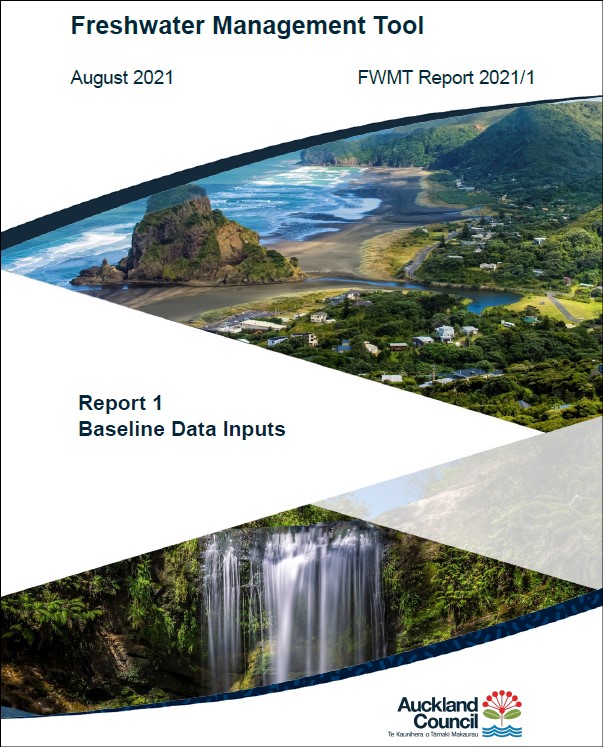Freshwater management tool: report 1. Baseline data inputs
Author:
Auckland Council Healthy Waters Department, Nick Brown, Tom Stephens, Theo Kpodonu, Mahesh Patel, Paradigm Environmental, Dustin Bambic, John Riverson, Khalid Alvi, David Rosa, Xiaomin Zhao, Morphum Environmental, Caleb Clarke, Hana Judd, Andrew RosaakSource:
Auckland Council Healthy Waters Department, Paradigm Environmental, Morphum Environmental LtdPublication date:
2021Topics:
EnvironmentFreshwater management tool: report 1. Baseline data inputs
Executive summary
The Freshwater Management Tool (FWMT) is a continuous and process-based water quality accounting framework for the Auckland region. In its first iteration (Stage 1) contaminants simulated include total suspended solids (TSS), total and dissolved forms of nutrients (TN, DIN, TON, TAM, TP, DRP), total forms of heavy metals (TCu, TZn) and faecal indicator bacteria (E. coli). The FWMT Stage 1 simulates the generation, transport and fate of contaminants in multiple flow paths across and through land, and ultimately along instream freshwater environments.
This report documents the inputs (sources of information) used in the configuration of the FWMT Stage 1. The report identifies sources of information including hierarchies (where multiple datasets overlap) and regional coverage. A mix of observed and modelled sources of best available information were utilised as inputs to the FWMT Stage 1, including geospatial information derived from regional and national datasets.
The choice of input data varied with coverage, resolution, quality and consistency of spatial and temporal information over the baseline period (2013-17) and as of model development (commencing in 2017-18).
Data inputs span a range of model sub-routines, including:
- Sub-catchments (derived using regional LiDAR topography and overland flowpath information)
- Stream network (inclusive of >500mm stormwater networks)
- Climate (inclusive of gauged and virtual climate station networks)
- Wastewater network and discharge (inclusive of six major reticulated networks [Watercare] and onsite wastewater)
- Impoundments (inclusive of ponds, dams and reservoirs)
- Hydrological response units (inclusive of soil, slope activity and impact factors spanning 106 unique contaminant and hydrological responses)
- Reach groups (inclusive of nutrient and erosion types)
Combined, input datasets derived for the FWMT offer baseline information on climate, biophysical, land activity and stream characteristics spanning the full region and resolved to 5465 sub-catchments of <40-100 ha.
This report should be read with the FWMT Baseline configuration and performance report to determine how input datasets were configured prior to simulation of baseline hydrology and contaminant state throughout freshwater streams in the Auckland region.
FWMT report 2021/1
Auckland Council, September 2022
*****
List of Freshwater Management Tool reports
2. Baseline configuration and performance | Report 2, appendices (in preparation)
3. Baseline state assessment (rivers) | Report 3, appendices (in preparation)
4. Current state assessment (lakes). Not published. Inquiries to: fwmt@aucklandcouncil.govt.nz
5. Review of the freshwater management tool. Baseline state assessment (rivers)
6. Literature review of primary sector responses to water quality: efficacy and cost
7. Riparian area management scenarios. Freshwater management tool
8. Lifecycle costs and benefits for rural mitigations in the freshwater management tool
11. Recommendations for improving rural mitigation modelling in the freshwater management tool
*****
Inquiries to: fwmt@aucklandcouncil.govt.nz
